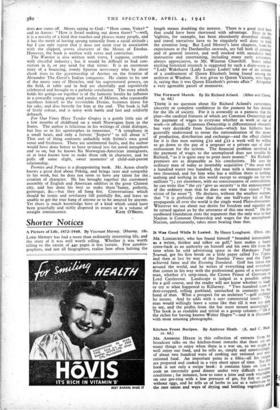The Forward March. By Sir Richard Acland. (Allen and Unwin.
3s. 6d.) THERE is no question about Sir Richard Acland's earnestness, sincerity or complete confidence in the panacea he has devised for the ills of society. For it is avowedly as a panacea that the plan—the cardinal features of which are Common Ownership and the payment of wages to everyone whether in work or out of work—is offered. Common Ownership is differentiated obscurely but very decidedly from Socialism—which has hitherto been generally understood to mean the nationalisation of the means of production, distribution and exchange—and the effect claimed for it is that men earning Lao and £12 a week will be willing to go down to the pay of a sergeant or a private out of sheer enthusiasm for the system. The financial problem involved in the payment of wages to the unemployed does not trouble Sir Richard, " as it is quite easy to print mere money." Sir Richard's premises are as disputable as his conclusions. He sees the ordinary man of today as insatiably acquisitive (" the man with a hundred wants two hundred, the man with a thousand wants two thousand, and for him who has a million there is nothing, nothing and nothing in this world except to struggle on for two millions ") ; yet elsewhere, with no consciousness of contradiction, he can write that " the cry ' give us security ' is the announcement of the ordinary man that he does not want that vision" [" the vision of far more "I. He declares, without the smallest warrant, that " it is perfectly clear that the one bull's-eye hit of Nazi propaganda all over the world is the single word Pluto-democracy. Whatever we say about our desire for freedom and equality can be turned against us by the utterance of this one word." On this cardboard foundation rests the argument that the only way to beat Nazism is Common Ownership and wages for the unemployed. Nazism, unfortunately, takes more beating than that.


























 Previous page
Previous page